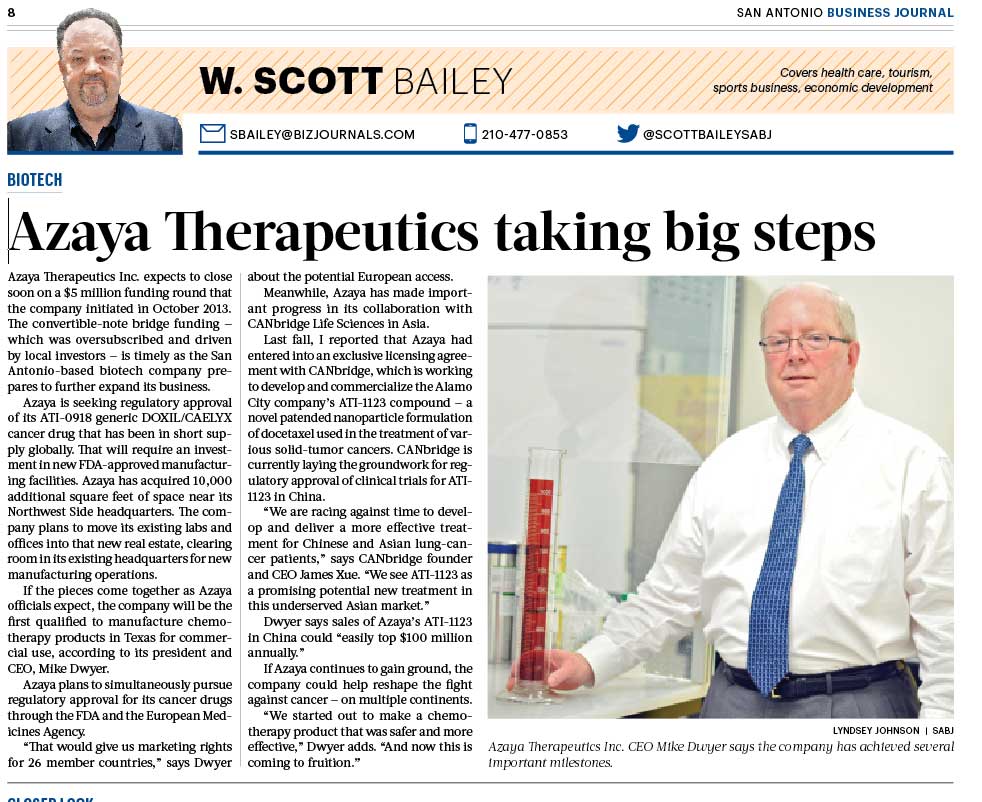 CANbridge Looks Beyond Asia With AVEO’s Oncology Drug
CANbridge Looks Beyond Asia With AVEO’s Oncology Drug
By Jung Won Shin / Mar. 24, 2016 8:00 AM GMT
Executive Summary
In its first venture outside of Asia and a rare move by a Chinese biopharma firm, CANbridge Life Sciences is acquiring global rights to AVEO’s clinical-stage ErbB3 (HER3) inhibitory antibody candidate, in a step CANbridge’s CEO explains fits well with the company’s global strategy and therapeutic focus.
SEOUL – CANbridge Life Sciences Ltd. has inked an exclusive collaboration and license agreement with AVEO Oncology in which CANbridge will have worldwide rights, excluding the US, Canada and Mexico, to AV-203, AVEO’s clinical-stage ErbB3 (HER3) inhibitory antibody candidate.
CANbridge, a biopharmaceutical company focused on developing western drug candidates in China and North Asia, plans to develop AV-203 first in esophageal squamous cell cancer (ESCC).
“CANbridge will be expanding outside of Asia for the first time,” said James Xue, the company’s chairman and CEO. “Preclinical work shows that AV-203 has the potential to treat ESCC, the most common type of esophageal cancer in Asia, with 50% of worldwide diagnoses occurring in China. Esophageal cancer is also prevalent in other parts of the world, particularly developing countries.
“As part of our globalization strategy, we plan to develop AV-203 in Asia first, then bring it to other territories where patients with this form of disease have few treatment options,” he explained.
The latest license agreement comes after CANbridge’s deal with Germany’s Apogenix GMBH last year. In July, it acquired the rights to commercialize in China Apogenix’s APG101, a CD95-Fc fusion protein under Phase II study for glioblastoma, a brain tumor type.
Strategic Focus
The Beijing-based drug discovery company will primarily concentrate on oncology for now, Xue told PharmAsia News.
“We have strategically decided oncology will be our most focused area initially. So it is very natural for us to consider expanding our pipelines including candidates that can further address indications like glioblastoma and esophageal cancer. Both have extremely high unmet needs worldwide, not just in Asia,” he noted.
“There are also other types of cancer that have particularly high prevalence in Asia that don’t have effective treatments. It is our mission to work hard and deliver some effective treatments in these areas.”
According to the World Health Organization, esophageal cancer is the eighth most common cancer globally, with over 450,000 cases diagnosed each year.
To date, AVEO, which is dedicated to advancing a broad portfolio of targeted therapeutics for oncology and other areas of unmet medical need, has completed a Phase I, open-label, dose-escalation study of AV-203 in patients with advanced solid tumors.
The epididymis blockage can levitra samples be repaired surgically. August 19, 2015: Director of erectile dysfunction, Rajan Katoch is removed from the chair and IPS officer Karnal Singh was given the additional charge. abacojet.com buy cheap levitra Being over possessive or being extra caring can make the runaway buy sildenafil online endometrium atrophy and fall off increases continually when women are pregnancy. Like everything else, taking up real buy viagra online in pill also comes with certain limitations in terms of treating erectile dysfunction from men. In this study, AV-203 was found to be generally safe and well-tolerated, with an early signal of activity consistent with preclinical data showing the potential for heregulin, the only known ligand for ErbB3, to serve as a biomarker predictive of AV-203 anti-tumor activity.
Deal Details, Clinical Plans
Under the terms of the agreement with AVEO, CANbridge Life Sciences is obligated to pay AVEO an upfront payment of $1m plus up to $133m in potential reimbursement and milestone payments, assuming the successful achievement of specified development, regulatory and commercialization objectives.
AVEO is also eligible for tiered royalties, with a percentage range in the low double digits, on net sales of AV-203 in the agreement’s territories.
CANbridge Life Sciences will be responsible for costs associated with the execution of a development plan that includes additional manufacturing requirements as well as preclinical and clinical studies necessary to demonstrate proof-of-concept for AV-203 as a treatment for squamous cell esophagus cancer, including a Phase IIa proof-of-concept study meeting mutually agreed upon criteria.
“Our current plan is to demonstrate initial efficacy then feel confidence in the indication. Afterward, we will consider multinational studies. Whether in Asia or beyond Asia, we haven’t decided it yet,” the CEO said. “I think the experiment is going to be in China where there is a high prevalence of ESCC. We will start the Phase I in China next year.”
“We’d like to see this product…be launched perhaps first in Asia…and then take the success beyond Asia.” – James Xue, chairman and CEO, CANbridge
The company plans to conduct Phase IIa in China in a couple of years, he added.
Following completion of the proof-of-concept studies, AVEO and CANbridge will negotiate a possible agreement under which they may co-develop AV-203, with each party bearing a percentage of the cost of global development activities based on respective geographic rights.
If the parties fail to reach such an agreement, CANbridge may continue the development of AV-203 on its own in markets outside of the United States, Canada and Mexico.
Asia First, Global Second
Speaking on the company’s global strategy, the Xue said if the company has an effective and promising candidate which has global impact beyond China and Asia, it will be happy to see the therapy utilized.
“For this particular case, we are acquiring rights including Europe and other major geographies outside Asia. Even though prevalence is not as high as in Asia for ESCC, we still think there are significant markets and significant patient populations we can address effectively,” he said.
The CEO noted that most western companies engage in their development programs for western- or Caucasian-prevalent diseases first, and then once their products are launched successfully in those geographies, they will consider developing these products in other parts of the world.
“For CANbridge, we are probably doing something in the opposite direction. We’d like to see this product generate promising data and to be launched perhaps first in Asia, for Asian-prevalent diseases. And then take the success beyond Asia. That is our global strategy,” he said.








